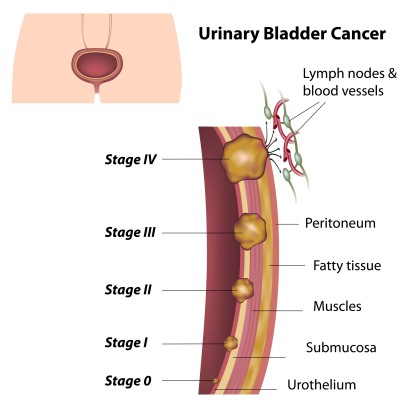What is Bladder Cancer?
The most common form of bladder cancer is transitional cell (urothelial) carcinoma. Many forms of malignancy may occur in the epithelial lining of the urinary bladder which in turn may spread through the lining into the muscular wall of the bladder. Bladder cancers most often are defined by how far they have traveled into the wall of the bladder.
- Non-invasive bladder cancers remain in the inner layer of cells and have not grown into deep deposits in the wall of the bladder. Most non-invasive bladder cancers are detected early and surgery can almost always remove these tumors.
- Invasive cancers grow into the wall of the bladder making it easier for the cancer to spread to the lymph nodes, other organs of the body such as the kidneys, liver and lungs. Treatment will be determined by your physician based upon how much the cancer has spread. Once treated for bladder cancer it is not uncommon for the disease to return and your physician may recommend having chemotherapy or immunotherapy to lower the risk of return.
Symptoms of bladder cancer –
- Blood or redness in the urine
- Pain during urination
- Frequent urination
- Difficulty urinating
If you are experiencing any of these symptoms it’s important to see your doctor. Diagnosis of bladder cancer will include a urine culture (searches for bacteria in the urine) and urinalysis (searches for existence of blood) and or check for tumor makers as well as a urine cytology test which will check for abnormal cells. For more information, please contact Dominion Internal Medicine @ 540.878.5408 or visit www.dominioninternalmedicine.com. Most insurances accepted. Now seeing new patients!
Compassionate Care for a Healthy Heart, Body, and Mind


